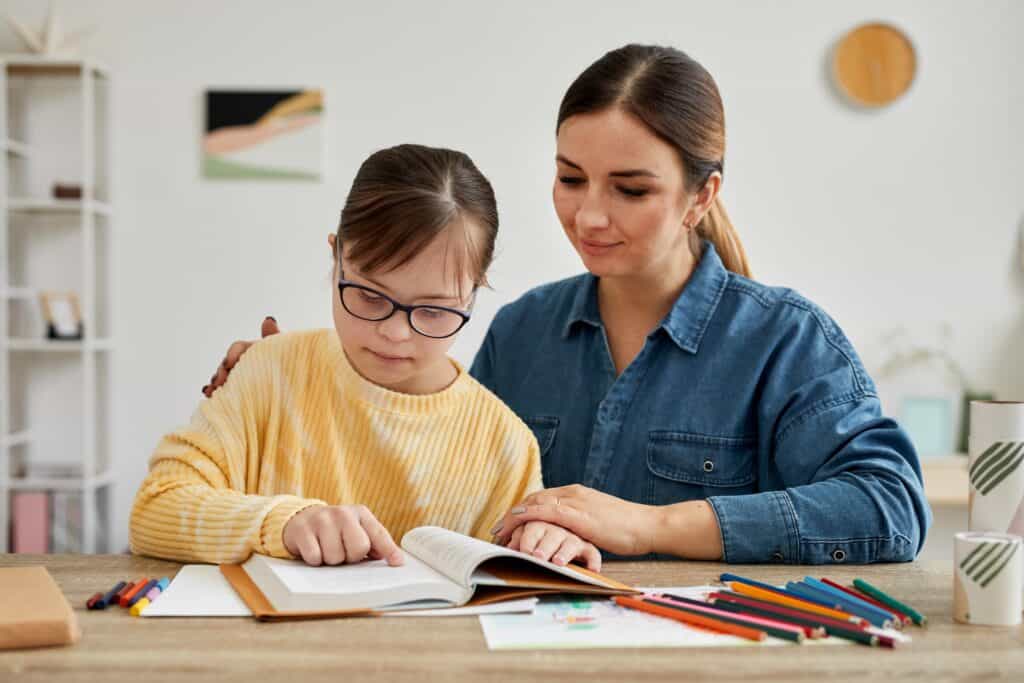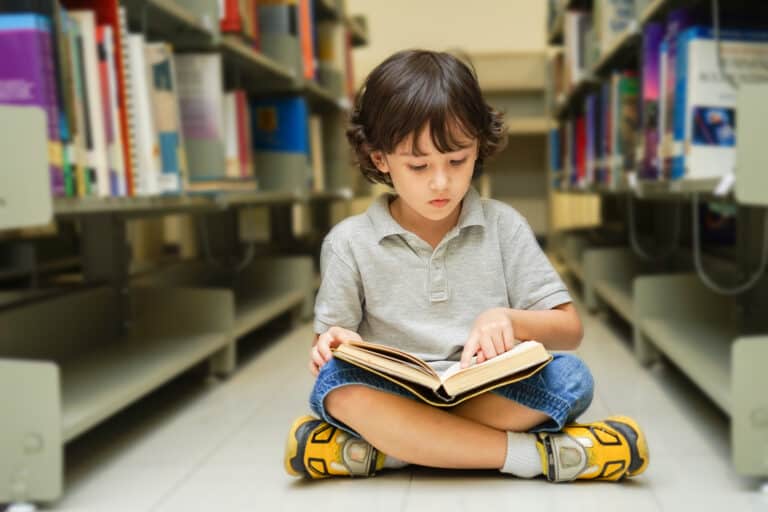Miacademy’s Online Language Arts Curriculum
Language arts require a solid foundation for student success. Reading, writing, and speaking are communication skills we use every day! These skills are essential to thrive academically, socially, and professionally.
Choosing the Best Homeschool Language Arts Curriculum
A well-rounded language arts curriculum combines many skills into one. Phonics comes first, as children learn to blend, decode, and build their reading fluency. They will begin to learn spelling patterns as they build their phonemic awareness. Once a child begins to read, their studies expand into identifying themes, genres, and word meanings.
A strong language arts program provides children with a variety of tools to become successful readers and writers. Miacademy offers daily vocabulary practice and weekly reading comprehension passages to expose students to new words, genres, and ideas. Our research-based program helps students develop a range of skills, from identifying letters to applying analogical reasoning.

Miacademy’s Language Arts Homeschool Curriculum
At Miacademy, our language arts curriculum is broken apart into different levels for each key facet of literacy so your student can feel confident working at the level that’s right for them. For example, your child may be on Level D with Language Skills and on Level C with Reading Comprehension. Here is an overview of the course types for each grade level:
- Learn to Read (Levels A-C Only)
- Learn to Read focuses on letter sounds, rhyming words, and common letter combinations to build recognition skills. Students also learn about vowels and consonants to help them sound out unfamiliar words.
- Language Skills
- Language Skills teaches comprehension strategies, storytelling devices, and grammar skills that students can apply to their own reading and writing practice. Language Skills builds students’ writing skills and is often assigned with our weekly Reading Comprehension practice.
- Reading Comprehension
- After mastering our Learn to Read courses, students are ready to put Language Skills concepts into practice with our weekly Reading Comprehension! This course provides a weekly reading passage with comprehension questions for students to practice their reading skills.
Each lesson begins with an engaging video that teaches a new reading strategy. After the video, the student will receive an untimed reading passage, followed by a series of comprehension questions.
Early Elementary Language Arts Curriculum
In the lower elementary grades, we focus on reading fluency first and foremost. Children learn to read sight words, consonant digraphs, and blends. They develop their ability to hear and chunk sounds by counting syllables and exploring rhymes.
As children become fluent, they begin to work with vowel digraphs, silent letter words, compound words, and open and closed syllables. In early elementary school, we want to take children from “learning to read” to “reading to learn.”
Kindergarten Language Arts Curriculum (Level A)
Our kindergarten ELA curriculum takes the mystery out of learning to read! Children also learn sequencing and oral storytelling. These storytelling skills will help students analyze and write their own texts in the future.
1st Grade Language Arts Curriculum (Level B)
In our Level B courses, students learn about vowel word families, sentences, and introductory grammar rules. Learn to Read: Level B focuses on vowel word families, spelling, and sight word practice.
2nd Grade Language Arts Curriculum (Level C)
Our Level C courses focus on reading with consonant blends and short versus long vowels. Students at this level will also learn about story elements, main ideas, nouns and verbs, sentence types, and paragraphs. At this stage, students often begin reading their very first chapter books.
3rd Grade Language Arts Curriculum (Level D)
In Level D, students focus on writing skills and reading passages with a little more challenge. Students will begin to analyze types of sentences and parts of speech, such as:
- Adjectives
- Pronouns
- Subjects and predicates
- Prefixes and suffixes
- Synonyms and antonyms

Upper Elementary Language Arts Curriculum
Upper elementary students use their reading comprehension skills for deeper explorations into writing. Children learn about building sentences and parts of speech that they can incorporate into their own work. This solid reading and grammar foundation sets students up for success in middle school.
4th Grade Language Arts Curriculum (Level E)
Level E focuses on verb variations, possessive and reflexive pronouns, and phrases and clauses. Students will also continue to hone their writing skills by studying different forms of writing and the writing process. Level E also teaches basic research skills, such as using a dictionary or a computer to find information.
5th Grade Language Arts Curriculum (Level F)
In Level F, students learn about personal narratives, fictional narratives, and advanced punctuation. Level F students learn about subordinating conjunctions and complex sentences to use in their own works.
Middle School Language Arts Curriculum
Middle school language arts prepare students for the rigor of reading and writing expected in high school. Students begin analyzing not only what they are reading but also the author’s purpose and argument. As they analyze these aspects in their reading, their own concept of writing begins to evolve. Our writing lessons focus on advancing grammar, incorporating details, and writing persuasive and comparative essays.
6th Grade Language Arts Curriculum (Level G)
Level G exposes students to a wide variety of reading genres, including fiction, literary nonfiction, drama, poetry, and nonfiction. Students will also practice identifying context clues, making inferences, and citing evidence in text. They will also learn about poetic devices, figurative language, expository writing, and advanced grammar concepts.
7th Grade Language Arts Curriculum (Level H)
Level H is about advancing grammar skills and persuasive writing. Students will complete persuasive writing pieces to demonstrate their understanding of grammar rules and the writing process. Reading Comprehension: Level H continues to provide students with a range of genres to practice their reading skills.
8th Grade Language Arts Curriculum (Level I)
At this level, students are demonstrating high school readiness with more complex reading practice and analysis. Throughout the course, students explore diverse literary and nonfiction texts, including short stories, poetry, drama, and historical speeches. Students also hone their critical thinking and media literacy skills with their first research project. In the final unit, students will learn to craft an argument and end the course with a persuasive writing project, focused on making the world a better place.
Miacademy’s Online Language Arts Curriculum
Whether your child is learning the alphabet or using rhetorical devices, our curriculum can help them thrive! Our language arts curriculum for homeschoolers helps cultivate a love for reading, language, and vocabulary by incorporating it into all core subjects.
We aim to engage students and make learning fun with a diverse array of materials and activities. Our engaging learning videos and on-level interactive activities aid in students’ connection to their education. Features like read-aloud options, non-timed assessments, and a moderated student community ensure a safe learning environment.
Our accredited curriculum is designed with quality and accessibility in mind, catering to many diverse learners. It’s flexible and customizable, allowing students to learn at their own pace. With access to all grades, students can learn on-level in each subject and request the levels that provide the right amount of challenge.
Want to learn more about how Miacademy can help your child with language arts? Feel free to contact one of our friendly customer service agents! They’ll be happy to help you with any questions you may have.
Updated 02/14/2024


